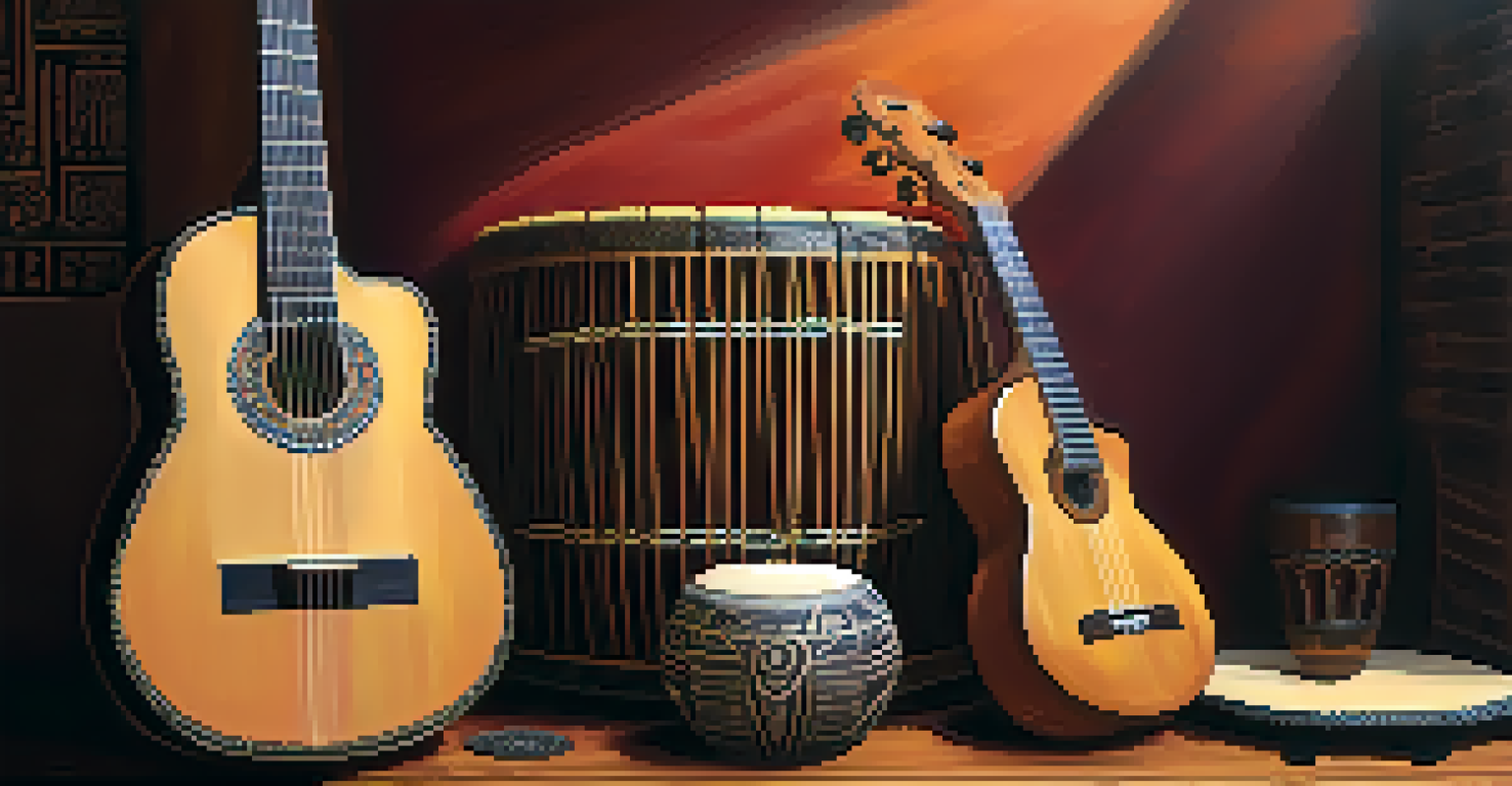Music and Identity: The Role of Genres in Cultural Heritage

Understanding Music as a Reflection of Identity
Music is more than just sound; it's a powerful expression of who we are. It reflects our feelings, experiences, and even our cultural background. For many, the songs they love tell stories about their lives and the communities they belong to.
Music is the shorthand of emotion.
When we listen to music, we often find pieces of our identity within the lyrics and melodies. For instance, a person's love for reggae might connect them to a broader narrative of resistance and empowerment originating from Jamaica. This connection solidifies their identity in a global context.
Ultimately, music serves as a mirror, reflecting our individuality while also uniting us with others who share similar backgrounds or values. It’s this dual role that makes music such a vital part of our cultural fabric.
The Influence of Genres on Cultural Identity
Different music genres often embody distinct cultural narratives and histories. For example, hip-hop emerged from the streets of the Bronx and encapsulates the struggles and triumphs of marginalized communities. Its beats and lyrics resonate with the experiences of many, making it a vessel for cultural expression.

Similarly, traditional music genres like bluegrass or flamenco carry the heritage of their regions, telling stories passed down through generations. These genres not only showcase unique sounds but also the values and customs of the cultures they represent.
Music Mirrors Our Cultural Identity
Music serves as a powerful expression of our individuality and cultural backgrounds, connecting us to shared narratives and experiences.
By engaging with various genres, individuals can explore new facets of their identity. It allows them to connect with their roots or even discover new influences, enriching their understanding of themselves and others.
Music Festivals: Celebrating Cultural Diversity
Music festivals serve as vibrant gatherings that celebrate diverse cultural identities. Events like Coachella, Glastonbury, or local cultural festivals bring together artists and fans from various backgrounds, creating a melting pot of musical genres. These gatherings highlight how music can bridge cultural divides.
Without music, life would be a mistake.
At these festivals, attendees experience not just music but also the traditions, food, and art of different cultures. This immersive experience fosters a sense of community and appreciation for diversity among participants. It reinforces the idea that music is a universal language.
As people dance to different rhythms and share their stories, they forge connections that transcend geographical boundaries. Music festivals remind us that, despite our differences, we can come together to celebrate our shared love for sound.
The Role of Music in Preserving Cultural Heritage
Music plays an essential role in preserving cultural heritage, acting as a living archive of traditions and stories. Many cultures use songs to pass down history, values, and customs to future generations. For instance, Indigenous cultures often use music in ceremonies to maintain their spiritual practices.
By keeping these musical traditions alive, communities ensure that their histories are not forgotten. This preservation is vital in an increasingly globalized world where cultural homogenization can overshadow unique identities. Music acts as a reminder of where we come from.
Genres Reflect Diverse Histories
Different music genres encapsulate unique cultural narratives, allowing individuals to explore their roots and enrich their understanding of themselves.
Moreover, as newer generations embrace traditional music, they often blend it with contemporary styles, creating fresh interpretations that honor the past while looking forward. This evolution ensures that cultural heritage remains relevant and resonates with today’s audiences.
How Music Shapes Personal Identity
On a personal level, the music we choose to listen to can significantly shape our identity. It influences our moods, attitudes, and even the way we present ourselves. For many, playlists are curated not just for enjoyment but as a reflection of their beliefs and experiences.
For example, someone who listens to empowering pop anthems may find that these songs inspire confidence and resilience in their daily life. Similarly, a person drawn to melancholic indie tunes might resonate with themes of introspection and vulnerability.
As we navigate life, our musical preferences can evolve, marking different phases of our identity journey. This evolution often mirrors our experiences, relationships, and the changes we undergo as individuals.
The Global Influence of Music Genres
Music genres have transcended borders, influencing cultures worldwide. For instance, the rise of K-pop has not only affected South Korea's music industry but has also created a global fandom that celebrates Korean culture. This phenomenon illustrates how music can serve as a cultural ambassador.
Moreover, genres like salsa, reggae, and electronic dance music have found their way into various cultural contexts, leading to unique fusions that enrich the global music landscape. Each blend tells a story of cultural exchange, showcasing the beauty of diversity.
Festivals Celebrate Cultural Diversity
Music festivals create vibrant spaces for cultural exchange, showcasing how music unites people across different backgrounds and traditions.
As these genres spread, they invite listeners to engage with and appreciate different cultural perspectives. This cross-cultural dialogue fosters understanding and creates a more interconnected global community.
The Future of Music and Cultural Identity
As technology evolves, so does the way we experience music and cultural identity. Streaming platforms have made it easier than ever to access a vast array of genres from around the world. This accessibility allows individuals to explore and embrace different cultures at their fingertips.
However, the challenge lies in navigating this vast ocean of music without losing the essence of cultural significance. It's essential to approach new genres with respect and an understanding of their origins, ensuring that cultural appropriation doesn’t overshadow genuine appreciation.

Looking ahead, the intersection of music and cultural identity will continue to evolve, reflecting the changing dynamics of society. As we embrace new influences while honoring our roots, music will remain a vital thread in the tapestry of cultural heritage.